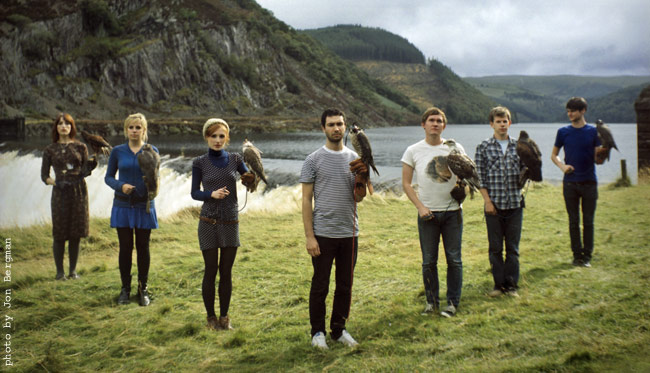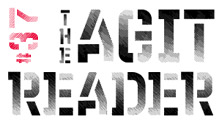
Not Too Much Too Soon
by Kevin J. Elliott
Being prolific is not always synonymous with doling out quality work, but in the case of Los Campesinos, the Welsh septet who has released two equally enchanting and raucous albums during the last twelve months, being prolific is second nature, an instinct that can’t be controlled. First, in February of 2008, came their debut, Hold on Now... Youngster, an introduction to the band’s ecstatic blend of sugary orchestral arrangements and punk-pop theatrics. Then, in October of the same year, they unleashed We Are Beautiful, We Are Doomed, a concept record of sorts that spread their slogans on heartbreak and syllable-crammed spiels on youth in the 21st century onto a much wider sonic canvas. On initial listens, it’s not clear how the two differ, but closer inspection reveals that within the nine-odd months that separate the two, the band crossed a distinct line, from simply buzzing in their own hormones and endorphins to taking everything learned from the Smiths to Sleater-Kinney to the Super Furry Animals and splattering it against a brick wall to see what sticks. The latter side shows a confidence in controlled chaos, an ability to interpret emotions and transform them into a singular art, to find definite patterns in their joy and sadness and amplify them through a miniature exposition of xylophones, violins, synthesizers, and earnest rockisms.
Back when they were a nervous pack of fanboys/girls playing their first ever SXSW stage, it was apparent they were green, just giddy to be in front of an American crowd who may have known a chorus or two. Now, especially during a recent packed house in Columbus, the synergy is infectious, an army so tight and uniformed it spills over into a crowd of followers hanging on every twinkling note and ultra-literate lyric. Being prolific has paid off. Living in the moment has become a necessary action of the modern pop band, and it shows. Even if they can only rally the youth for another duo of albums, what they’ve accomplished already is important for the status of pop music. When speaking with the band’s extremely polite and eloquent frontman, Gareth Campesino, I got the sense that he realizes even bigger things are about to happen—a spot at Coachella and a super-secret side-project that will have indie-geeks salivating, in addition to recording their third record—but he was just too modest to admit such things.
Last year was a huge year, with the two albums and the many tours. Was releasing We Are Beautiful, We Are Doomed something that you kind of forced to gain some more momentum, or was it necessity, something that came pretty naturally?
Gareth Campesinos: It had only been four months since we released Hold on Now... Youngster before we left to record the new one. But the songs from Youngster were all the songs we’d written as a band since the beginning, so we’d been playing those songs for almost two years. Going out and playing the same sets every night was pretty tiring for us. And I think it was unfair for people who would come to see us and then come to see us two months later only to hear the same songs, maybe even in the same order. We had the ideas for these new songs, and especially lyrically, I get bored fairly quickly with what I write. I’ve changed quite a bit since the band started, so some of the older stuff I don’t really get along with anymore. We knew we could wait another year, but that felt dishonest knowing these songs were how we were feeling at that time. If we were just recording them and releasing them now, they wouldn’t feel fresh or exciting. Luckily, Wichita in the UK was very supportive and said that if we wanted to do it, then go ahead and do it. It was good.
Obviously when you listen to the two albums back to back you can hear that as a group you were in two different states when making them, but exactly where that is somewhat blurry. I tend to think the latest album is darker, dramatic and musically grand in scope, where the first one is more playful, referential and scruffy. Can you elaborate on how the band changed between the makings of these two records?
GC: Youngster is basically a collection of Los Campesinos’ greatest hits from that time, every song we had. The new one is mostly about how the songs work together. In those 30-odd minutes, there’s a lot more texture, a lot more peaks and drops. At times, on Youngster, I was trying to second guess what people wanted from Los Campesinos. It was a time when I wasn’t really sure what we wanted to be yet. These songs are much more personal. They’re entirely autobiographical, and I’ve settled into writing like that, and I quite like that. That’s what makes me so excited about starting the next one.
On Youngster, I think you injected a great deal of youth and frivolity, maybe even a bit of naivety, into the songs. For instance, there’s a lot more confusion in sex and references to bands, trends, dates and times than the new one. Do you ever get worried that those themes might become dated for future generations or are you not too worried about making music “for the moment?”
GC: No, that’s one thing that I don’t worry about. There are a lot of bands that probably look at their back catalog and will at least outwardly say that they agree with it all. But I think it’s inevitable, especially with the age that we’re at and the age of the band, that there’s stuff like “We Throw Parties, You Throw Knives” that I simply can’t stand. That’s a good thing, because we were writing that song there and then, and it perfectly captures that particular moment. That’s what I was like as a person back then. I think pop music is not necessarily made to be timeless. It’s more about the here and now. That was our first time in the studio, so we were learning, and you can hear that too. I think that’s important, even if I can’t stand to listen to it now.
There seems to be an increased sense of urgency on the new one. In “Miserabilia” you all sing, “Shout at the world because the world doesn’t love you,” and “There is future in the fucking, but no fucking future,” on “We Are Beautiful, We Are Doomed.” Are these more personal themes about relationships and romance, or do they signal a bigger slogan by the band? If so, what’s the message?
GC: Undoubtedly there are certain bands that can do that and they do it well: they have a world view and an agenda. Personally, though, I couldn’t trust myself with that. It’s a personal decision. The whole record does just concentrate on about four themes, and it often returns to them and even references them, and that’s what I wanted to achieve. I wanted all 10 songs to work together; they all make sense. If you remove one song from the bunch, the significance is weakened. It’s completely preoccupied with a certain doomed relationship, and a fear and obsession with death.
So then do you think there’s still a lot of hopelessness and despondency among teens and young adults?
GC: No, I really don’t think so. I do believe that when we sing something like “Shout at the world because the world doesn’t love you,” that universally through life people continually have to undercut themselves and sell themselves for less than they’d ideally like. Everyone isn’t going to achieve what they want or be who they want to be. But again, I think something like that is still well within the realms of personal politics and not a part of any world view. I do want there to be an element for our fans to feel like they’re part of something that’s bigger than the band and bigger than themselves. I do think that Los Campesinos, compared to a lot of bands like us at this level in this moment in time, are giving people something they can relate to.
It’s possible to be “punk as fuck,” but—and this is a question I was forced to ask by a friend—is it possible to be “twee as fuck?”
GC: I think it is, but I don’t think that’s a positive thing, though. The whole “twee” thing—initially we really embraced it, which goes back to how naive we were at the time, and we were happy to be identified as a “twee” pop band. But lately we’ve come to see it as a negative thing. Live we are much closer to a punk band. We’re not tiptoeing around the stage, uncertain of what we are there to do. We’re there to play a rock show. It is possible to be “twee as fuck,” but it’s very difficult to be that way without trying to be. It’s when people purposely say, “I am Gareth, I am twee,” that it’s a bad thing. But I guess saying “I am Gareth, I am punk,” is a bad thing as well. I’d just prefer not to attach myself to any social movement or such.
Last is a more Columbus-centric question, but since you did tour with Times New Viking, which member of that band would you trust more with a newborn baby?
GC: Well, the person I have seen drunk least is probably Beth. Jared would just forget. Adam I would trust, but he might get bored pretty quickly. Beth is lovely and very caring—and less drunk.
